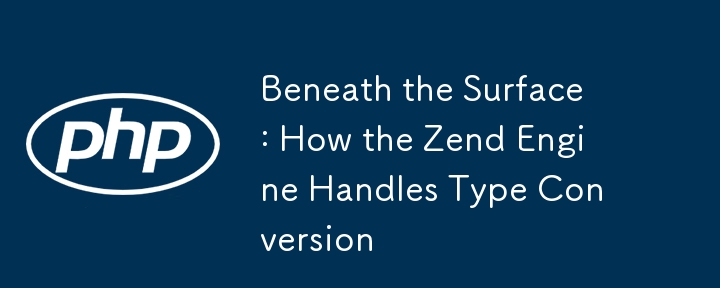 pembangunan bahagian belakang
pembangunan bahagian belakang
 tutorial php
tutorial php
 Di bawah permukaan: Bagaimana enjin zend mengendalikan penukaran jenis
Di bawah permukaan: Bagaimana enjin zend mengendalikan penukaran jenis
Di bawah permukaan: Bagaimana enjin zend mengendalikan penukaran jenis
Jul 31, 2025 pm 12:44 PMThe Zend Engine handles PHP's automatic type conversions by using the zval structure to store values, type tags, and metadata, allowing variables to change types dynamically; 1) during operations, it applies context-based conversion rules such as turning strings with leading digits into numbers; 2) in loose comparisons (==), it coerces types following specific rules that can lead to unexpected results like "0e123" == "0e456" being true; 3) arithmetic operators convert operands to numbers while concatenation forces strings; 4) these implicit conversions introduce runtime overhead and potential bugs, which can be mitigated by using strict typing and scalar type hints introduced in PHP 7 to enforce type safety and reduce reliance on automatic coercion, ultimately helping developers write more predictable and secure code.

When you write PHP code, it often feels like magic—assign a string to a variable, add it to a number, and somehow it just works. But beneath the surface, the Zend Engine, the core of PHP’s execution, is hard at work managing type conversions automatically. Unlike strictly typed languages, PHP is dynamically typed, which means variables can change types based on context. This flexibility comes at a cost: the engine must constantly evaluate and convert types during runtime. Understanding how the Zend Engine handles these conversions gives insight into both PHP’s convenience and its performance quirks.

How PHP Variables Work Internally
At the heart of PHP’s type system is the zval (Zend value) structure. Every variable in PHP is represented internally by a zval, which contains:
- The actual value
- A type tag (e.g.,
IS_LONG,IS_STRING,IS_BOOL) - Additional metadata like reference count and garbage collection info
Because of this structure, a single variable can seamlessly switch types. For example:

$var = "123"; // zval type: IS_STRING $var += 10; // zval type changes to IS_LONG after conversion
The Zend Engine detects that the + operator expects numeric operands, so it converts the string "123" to the integer 123 before performing the addition.
Automatic Type Conversion Rules
The Zend Engine follows well-defined rules when converting between types. These happen implicitly in expressions, comparisons, and function calls. Key conversion behaviors include:

String to number: If a string starts with numeric characters, PHP extracts the number.
"42apples"→42"apples42"→0(no leading digit)Booleans:
trueconverts to1,falseto0in numeric contexts.Null: Converts to
0when used numerically, or an empty string when used as text.Arrays and objects: Generally convert to
1as numbers or"Array"as strings (objects without__toString()throw errors).
These conversions occur on-demand. The engine doesn’t change the original zval type immediately unless necessary—sometimes it creates temporary converted values for a single operation.
Context Matters: Loose Comparisons and Operators
One of the most controversial aspects of PHP’s type handling is loose comparison (==). The Zend Engine applies complex coercion rules here:
"123" == 123 // true – string converted to int "0e123" == "0e456" // true – both treated as scientific notation → 0 null == 0 // true false == "0" // true
This behavior stems from the engine’s attempt to be helpful, but it’s led to security issues (e.g., hash comparison vulnerabilities). In contrast, strict comparison (===) skips conversion and checks both value and type.
Arithmetic and concatenation operators also trigger conversions:
.(concatenation) forces both operands to strings+,-,*,/force operands to numbers
So this code:
echo "Score: " . 100; // "Score: 100" echo "Score: " + 100; // 100 (string converted to 0, then 0 + 100)
The second line results in 100 because the + operator forces both operands to numbers. "Score: " becomes 0, and 0 + 100 = 100.
Performance and Pitfalls
While convenient, automatic type conversion has downsides:
- Runtime overhead: Every operation may require type checking and conversion
- Unpredictable behavior: Especially with edge cases like
"0xFF"vs"0xff"(only lowercase hex is recognized) - Bugs and vulnerabilities: Loose comparisons can bypass authentication checks if not handled carefully
The introduction of scalar type hints and return types in PHP 7 helped reduce ambiguity. Now you can enforce types in function signatures:
function add(int $a, int $b): int {
return $a + $b;
}Here, the engine will throw a TypeError if non-integers are passed (depending on strict mode), reducing reliance on implicit conversion.
Understanding how the Zend Engine handles type conversion isn’t just academic—it helps you write safer, more predictable code. Knowing when and how strings become numbers, or why "0" == false evaluates to true, lets you avoid common traps. While PHP’s flexibility remains one of its strengths, treating types with intention (and using strict typing when possible) keeps the magic from turning into mayhem.
Basically, the engine’s got your back when you want things to “just work”—but it pays to know what’s happening under the hood.
Atas ialah kandungan terperinci Di bawah permukaan: Bagaimana enjin zend mengendalikan penukaran jenis. Untuk maklumat lanjut, sila ikut artikel berkaitan lain di laman web China PHP!

Alat AI Hot

Undress AI Tool
Gambar buka pakaian secara percuma

Undresser.AI Undress
Apl berkuasa AI untuk mencipta foto bogel yang realistik

AI Clothes Remover
Alat AI dalam talian untuk mengeluarkan pakaian daripada foto.

Clothoff.io
Penyingkiran pakaian AI

Video Face Swap
Tukar muka dalam mana-mana video dengan mudah menggunakan alat tukar muka AI percuma kami!

Artikel Panas

Alat panas

Notepad++7.3.1
Editor kod yang mudah digunakan dan percuma

SublimeText3 versi Cina
Versi Cina, sangat mudah digunakan

Hantar Studio 13.0.1
Persekitaran pembangunan bersepadu PHP yang berkuasa

Dreamweaver CS6
Alat pembangunan web visual

SublimeText3 versi Mac
Perisian penyuntingan kod peringkat Tuhan (SublimeText3)

Topik panas
 Pendekatan Pragmatik terhadap Pemutus Jenis Data di PHP API
Jul 29, 2025 am 05:02 AM
Pendekatan Pragmatik terhadap Pemutus Jenis Data di PHP API
Jul 29, 2025 am 05:02 AM
Mengesahkan dan menukar data input lebih awal untuk mengelakkan kesilapan hiliran; 2. Gunakan sifat -sifat yang ditaip Php7.4 dan jenis pulangan untuk memastikan konsistensi dalaman; 3. Mengendalikan penukaran jenis dalam peringkat penukaran data dan bukannya dalam logik perniagaan; 4. Elakkan penukaran jenis yang tidak selamat melalui pra-pengesahan; 5. Menormalkan respons JSON untuk memastikan jenis output yang konsisten; 6. Gunakan logik penukaran jenis DTO yang berpusat, multiplexed, dan ujian dalam API yang besar untuk menguruskan jenis data dalam API dengan cara yang mudah dan boleh diramal.
 Bahaya tersembunyi jenis longgar php
Jul 30, 2025 am 05:39 AM
Bahaya tersembunyi jenis longgar php
Jul 30, 2025 am 05:39 AM
Selalu === dan! == TOAVOIDUNINDEDENDEDTYPECOERCIONINCOMPARISONS, as == canLeadToSecurityFlawsLikeAuthenticationBypasses.2.USEHASH_EQUALS () forcomparingpasswordHashesortokenStopReVent0escientNoTaRSPLOITS.3.3.3.3.3.3.3oidmoidmoidmitmitmitmitmitmitmitmitmitmitmitmitmitmitmitmitmitmitmitmitmitmitmitmitmitmitmitmitmitmitm
 Analisis perbandingan: `(int)` vs `intval ()` dan `setType ()` `
Jul 30, 2025 am 03:48 AM
Analisis perbandingan: `(int)` vs `intval ()` dan `setType ()` `
Jul 30, 2025 am 03:48 AM
(int) isthefastestandnon-destructive, idealforsimpleconversionswithoutalteringTheoriginalVariable.2.intval () provectBaseConverssionsUnsandissliglyslowerButuseforPorparsingHexorBinaryStrings.3.SetTyTeSePe ()
 Menavigasi perangkap pemutus dengan nulls, boolean, dan rentetan
Jul 30, 2025 am 05:37 AM
Menavigasi perangkap pemutus dengan nulls, boolean, dan rentetan
Jul 30, 2025 am 05:37 AM
nullbehavesistonsistentlywhencast: incavascript, itbecomes0numerically dan "null" asastring, whileinphp, itbecomes0asaninteger, anemptystringwhencasttoString, danfalseasaboolean -alwayscheckfornullexplicitlybybeAdoLyBeforeAdoLyBeforeAdoLyBeforeAdoLyBeforeAdoLyBeforeAdAdAdAdAdAdAdBerTaMulleAdoLyBeAdAdAdAdAdAdAdAdAdAdAdAdAdAdAdAs
 Di bawah permukaan: Bagaimana enjin zend mengendalikan penukaran jenis
Jul 31, 2025 pm 12:44 PM
Di bawah permukaan: Bagaimana enjin zend mengendalikan penukaran jenis
Jul 31, 2025 pm 12:44 PM
Thezendenginehandlesphp'sAutomOticTypeConversionsbythezvalstructureToStoreValuues, typetags, andmetadata, membenarkanvariablestochangetypesdynamically;
 Teknik Pemutus dan Paksaan Jenis PHP Lanjutan
Jul 29, 2025 am 04:38 AM
Teknik Pemutus dan Paksaan Jenis PHP Lanjutan
Jul 29, 2025 am 04:38 AM
Gunakan mengisytiharkan (strict_types = 1) untuk memastikan pemeriksaan jenis parameter fungsi dan nilai pulangan, mengelakkan kesilapan yang disebabkan oleh penukaran jenis tersirat; 2. Pemutus antara tatasusunan dan objek sesuai untuk senario mudah, tetapi tidak menyokong pemetaan lengkap kaedah atau atribut swasta; 3. SetType () secara langsung mengubah suai jenis pembolehubah pada runtime, sesuai untuk pemprosesan jenis dinamik, dan getType () digunakan untuk mendapatkan nama jenis; 4. Penukaran jenis yang boleh diramalkan harus dicapai dengan menulis fungsi tambahan jenis-selamat secara manual (seperti toint) untuk mengelakkan tingkah laku yang tidak dijangka seperti resolusi separa; 5. Jenis kesatuan Php8 tidak akan melakukan penukaran jenis secara automatik antara ahli dan perlu diproses secara eksplisit dalam fungsi; 6. Penambahbaikan atribut pembina harus digabungkan dengan str
 Jenis Penukaran dalam PHP Moden: Memeluk ketat
Jul 30, 2025 am 05:01 AM
Jenis Penukaran dalam PHP Moden: Memeluk ketat
Jul 30, 2025 am 05:01 AM
Usedeclare(strict_types=1)toenforcestricttypingandpreventimplicittypecoercion;2.Performmanualtypeconversionexplicitlyusingcastingorfilter_var()forreliableinputhandling;3.Applyreturntypedeclarationsanduniontypestoensureinternalconsistencyandcontrolled
 Amalan terbaik untuk pemutus jenis yang selamat dan cekap di pangkalan anda
Jul 29, 2025 am 04:53 AM
Amalan terbaik untuk pemutus jenis yang selamat dan cekap di pangkalan anda
Jul 29, 2025 am 04:53 AM
Prehtersafecastingmechanismslikedynamic_castinc, 'as'inc#, andinstanceofinjavatoavoidruntimecrashes.2.alwaysvalidateInputTypesbefeforecasting, terutama forusererinputordeserializedData, menggunakanTypechecksorvalidationlibraries.3.avaveavooDeVeAdAndationLibraries.3.2.3.3.3.3.3.3.3.3.3.3.3.3.3.3.3





